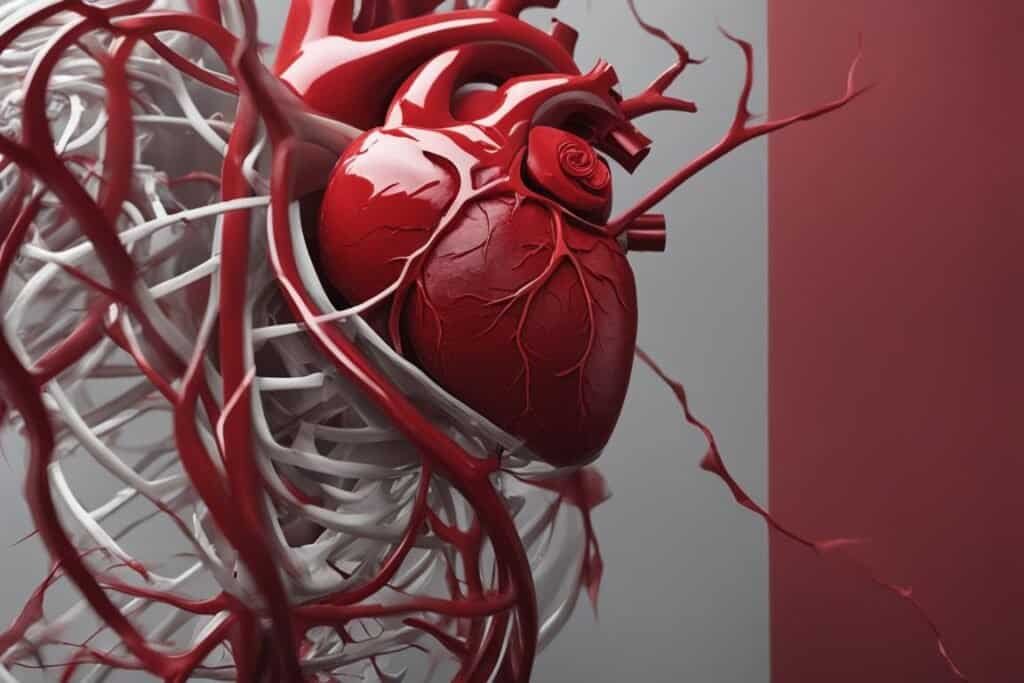Heart attacks can be a life-threatening event that requires immediate attention and action. To effectively recognize the signs and symptoms of a heart attack, it’s essential to understand the terminology associated with this condition. While heart attack is the commonly known term, there are other similar words that are used interchangeably, such as myocardial infarction, cardiac arrest, coronary thrombosis, and angina. Recognizing these terms can help you communicate effectively with medical professionals and comprehend related information.
Furthermore, understanding the risks associated with heart attacks is vital in taking preventative measures. Heart attacks are often caused by the blockage of blood flow to the heart, usually due to the buildup of fat, cholesterol, and other substances in the coronary arteries. By familiarizing yourself with these risks, you can make informed decisions about your lifestyle and make necessary changes to reduce the likelihood of a heart attack.
Key Takeaways:
- Heart attacks are commonly known as myocardial infarction, cardiac arrest, coronary thrombosis, or angina.
- Understanding the terminology associated with heart attacks can help facilitate communication with medical professionals.
- The risks of a heart attack are often connected to the buildup of fat, cholesterol, and other substances in the coronary arteries.
- Recognizing and managing these risks can play a crucial role in preventing heart attacks.
- Make necessary lifestyle changes to reduce the likelihood of a heart attack.
What is a Heart Attack?
A heart attack occurs when a part of the heart muscle does not receive enough blood due to a blockage in the arteries. This blockage is usually caused by fatty deposits known as plaques.
The symptoms of a heart attack can vary but commonly include:
- Chest pain or discomfort
- Pain or discomfort in the jaw, neck, back, arm, or shoulder
- Shortness of breath
- Nausea
It is important to recognize these symptoms and seek immediate medical attention.
Causes of Heart Attack
The primary cause of a heart attack is coronary artery disease. This condition occurs when the coronary arteries, which supply blood to the heart, become narrowed or blocked due to the buildup of plaques.
Other causes of heart attack include coronary artery spasm, certain infections such as COVID-19, and spontaneous coronary artery dissection.
Understanding the underlying causes can help in prevention and management of heart attacks.
Coronary Artery Disease and Heart Attack Risk
Coronary artery disease is the most common cause of heart attacks. It develops over time due to various factors, including:
- High cholesterol levels
- High blood pressure
- Smoking
- Diabetes
- Obesity
- Family history of heart disease
These factors contribute to the buildup of fatty deposits, or plaques, in the coronary arteries. As the plaques grow, they can eventually block the flow of blood to the heart, leading to a heart attack.
| Causes of Heart Attack | Description |
|---|---|
| Coronary Artery Disease | Buildup of plaques in the coronary arteries |
| Coronary Artery Spasm | Sudden tightening or narrowing of the coronary arteries |
| Infections | Certain infections such as COVID-19 can trigger heart attacks |
| Spontaneous Coronary Artery Dissection | Sudden tearing of the coronary artery wall |
While coronary artery disease is the most common cause, it is essential to understand that other factors can also contribute to heart attacks. Seeking medical attention, making lifestyle changes, and managing risk factors are crucial steps in preventing heart attacks and maintaining heart health.

Risk Factors for Heart Attack
When it comes to heart attacks, several factors can increase your risk. By understanding these risk factors, you can take proactive steps to lower your chances of experiencing a heart attack. It’s important to be aware of the following factors that can increase the risk of heart attack:
- Age: The risk of heart attack increases as you get older.
- Tobacco Use: Smoking or using tobacco products can significantly raise your risk.
- High Blood Pressure: Uncontrolled high blood pressure puts extra strain on your heart and arteries.
- High Cholesterol or Triglycerides: Excess cholesterol and triglycerides can lead to plaque buildup in the arteries, increasing the risk of blockages.
- Obesity: Being overweight or obese can strain your heart and contribute to the development of other risk factors.
- Diabetes: Poorly controlled diabetes can damage blood vessels and increase the risk of heart attack.
- Metabolic Syndrome: A combination of high blood pressure, high blood sugar, excess body fat around the waist, and abnormal cholesterol levels can increase your risk.
- Family History of Heart Attacks: If your close relatives have had heart attacks, you may be at a higher risk.
- Lack of Exercise: Leading a sedentary lifestyle increases your risk of heart attack.
- Unhealthy Diet: Consuming a diet high in saturated fats, trans fats, cholesterol, and sodium can contribute to heart disease.
- Stress: Chronic stress can take a toll on your heart health.
- Illegal Drug Use: Certain drugs can increase the risk of heart attack.
- History of Preeclampsia: Women who have had preeclampsia during pregnancy may have a higher risk of heart disease.
- Autoimmune Conditions: Some autoimmune conditions, such as rheumatoid arthritis and lupus, can increase the risk of heart attack.
To lower your risk of a heart attack, it’s important to be proactive and make positive lifestyle changes. Talk to your healthcare provider about managing these risk factors and incorporating heart-healthy habits into your daily routine. By taking control of your health, you can reduce the likelihood of experiencing a heart attack and live a healthier, longer life.
Complications of Heart Attack
After experiencing a heart attack, it’s essential to be aware of the potential complications that can arise due to the damage caused to the heart muscle. Understanding these complications and seeking appropriate medical care is crucial for their proper management and prevention.
Here are some of the common complications that can occur as a result of a heart attack:
- Irregular or atypical heart rhythms: Following a heart attack, the heart’s electrical system may be affected, leading to abnormal heart rhythms, such as atrial fibrillation.
- Cardiogenic shock: This occurs when the heart is unable to pump enough blood to meet the body’s needs, leading to dangerously low blood pressure and organ failure.
- Heart failure: The weakened heart muscle may struggle to pump blood effectively, causing symptoms like fatigue, shortness of breath, and fluid buildup in the lungs and legs.
- Inflammation of the tissue surrounding the heart: This condition, known as pericarditis, may cause chest pain and discomfort, and in severe cases, it can lead to fluid accumulation around the heart.
- Cardiac arrest: In some instances, a heart attack can trigger an abnormal heart rhythm, resulting in a sudden loss of heart function. Prompt medical attention is crucial in such cases.
These complications highlight the importance of seeking appropriate medical care, closely monitoring your heart health, and following the advice of healthcare professionals after experiencing a heart attack.

Taking necessary steps to manage and prevent these complications is vital for a smoother recovery process and the long-term well-being of your heart.
Recovery After a Heart Attack
After experiencing a heart attack, it is crucial to take proactive steps to recover and minimize the risk of future health problems. By following the recommended measures, you can significantly improve your heart health and enhance your overall quality of life.
Here are some essential steps to take after a heart attack:
- Physical activity tailored to your capabilities: Engaging in regular exercise, as recommended by your healthcare professional, can aid in your heart’s recovery. Start with gentle activities like walking and gradually increase intensity and duration over time.
- Adopting a heart-healthy diet: Make dietary changes that focus on consuming nutritious foods such as fruits, vegetables, whole grains, lean proteins, and low-fat dairy products. Limit your intake of saturated fats, trans fats, cholesterol, sodium, and added sugars.
- Quitting smoking: Smoking is a significant risk factor for heart attacks and can hinder your recovery. Seek support from healthcare professionals or join smoking cessation programs to quit smoking successfully.
- Participating in cardiac rehabilitation programs: Cardiac rehabilitation programs offer structured exercise and education sessions to help you improve cardiovascular fitness, manage stress, and adopt a heart-healthy lifestyle.
- Managing other health conditions: If you have other health conditions like diabetes or high blood pressure, it is vital to work closely with your healthcare provider to manage them effectively. Take prescribed medications as directed and attend regular check-ups.
Taking these steps after a heart attack can aid in your physical and emotional recovery while significantly reducing the risk of future heart problems. Remember to consult with your healthcare provider to create a personalized recovery plan based on your specific needs and circumstances.
Conclusion
Understanding the terminology, risks, causes, and complications associated with heart attacks is crucial for recognizing the signs and symptoms and taking appropriate action. With proper knowledge, you can prioritize heart health and reduce the risk of a heart attack.
Preventing heart attacks starts with managing risk factors such as tobacco use, high blood pressure, high cholesterol, obesity, and diabetes. Adopting a healthy lifestyle that includes regular physical activity and a heart-healthy diet can greatly improve your heart health. It’s also important to seek prompt medical attention if you experience any symptoms of a heart attack.
Remember, prevention is key. By taking the necessary steps to prevent and manage heart attacks, you can protect your heart and lead a healthier life. Prioritize heart health today and ensure a healthier future for yourself and your loved ones.

